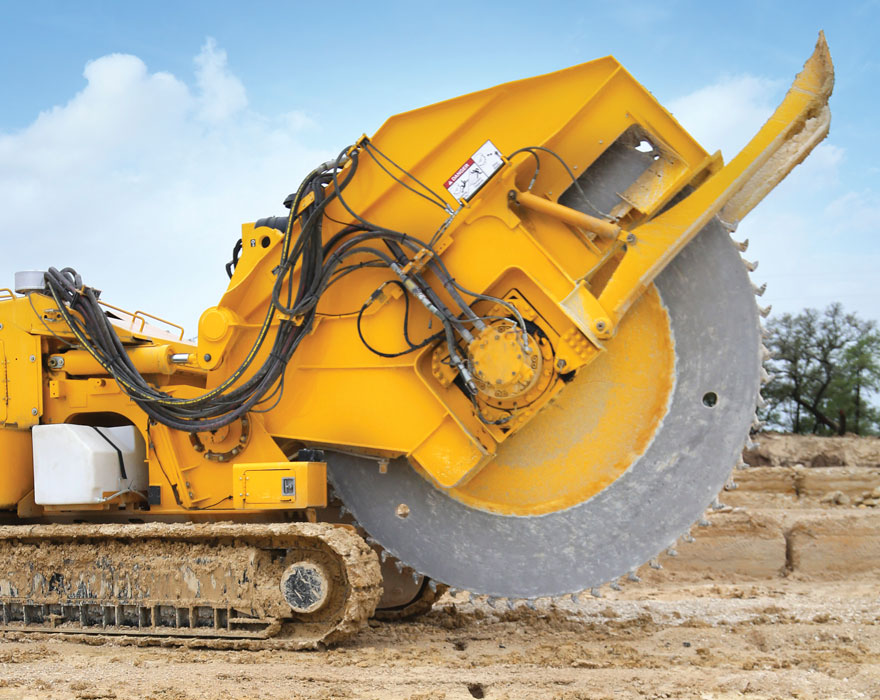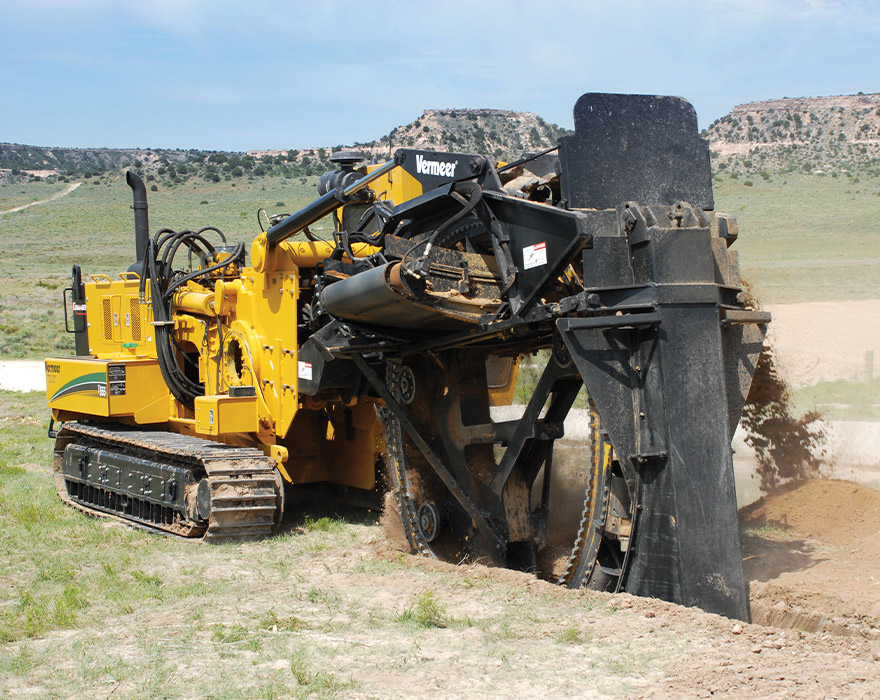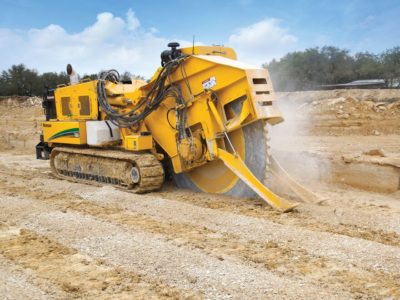When you see large trenchers cutting ditches on pipeline, water and sewer projects, versatility probably isn’t the first term that comes to mind. But cutting a deep and wide trench in rocky ground isn’t the only type of digging larger trenchers can do. Operators can outfit trenchers like the Vermeer T655 Commander® 3 trencher with rockwheel and bucket wheel attachments to deliver optimal digging in various ground conditions and product types.
Let’s look at where and when you should use rockwheel and bucket wheel attachments.
Rockwheel attachment
You may be familiar with rockwheel attachments. They’re often used on utility installation work in rocky grounds or when crews have to cut through concrete or asphalt for drop installs. But small utility-sized rockwheels and tractors can struggle to get the job done in solid rock. When that happens, it’s time to upgrade to a rockwheel attachment designed for use on larger, more-powerful trenchers.
The Vermeer T555 Commander® 3 and T655III trenchers excel at digging narrow trenches for small utility lines, like fiber and electric, in solid rock, concrete and asphalt conditions. The Vermeer center-mount rockwheel attachment for larger trenchers can cut a ditch 3-in to 10-in (7.6-cm to 25.4-cm) wide at depths up to 48 in (121.9 cm).
You could use an excavator with both a breaker attachment and rock buckets to cut a trench in rock; however, a rockwheel can cut a clean, straight-side trench in one pass. This is a unique advantage over common rock trenching solutions, leaving you with a flat trench bottom ready for product and fill material. This combination helps crews work efficiently, and supervisors optimize their labor force.

Bucket wheel trencher attachment
For highly productive trenching in soft soil conditions, it’s time to swap out a boom trencher for a bucket wheel attachment. A typical chain configuration positions the carbide trencher teeth in a specific formation or pattern. Alternately, a bucket wheel features a series of buckets rotating in a circular motion to help move more dirt from the trench. This trencher configuration works for installing fiber, electrical lines, water and sewer pipes, and for tiling in agriculture applications.
When using a bucket wheel attachment on the Vermeer T655III, you can cut a ditch 22 inches, 24 inches or 28 inches (55.9 cm, 61 cm or 71.1 cm) wide. This trenching combination is a productive solution for installing larger-diameter products over long distances.

Additional trencher attachment options
Rockwheel and bucket wheel attachments can help your team stay productive in varying soil conditions and for installing small-diameter products in rock. But you should also be aware you can customize any Vermeer large trencher with different boom length options and chain configurations to optimize your trenching performance from one job to the next.
And as you may know, the material excavated from a cut is stacked neatly next to the trench and can often be used as fill material. But on projects where new fill may be required or a jobsite without adequate space for excavated material, you also have the option of adding a loading conveyer to Vermeer trencher models. This optional attachment allows you to load excavated material directly into the back of a dump truck to be hauled away — no extra equipment required.
Finally, if you do tile work for farmers or on stormwater management projects, you may want to consider investing in a Vermeer T555III or T655III outfitted with a tile layer.
Exploring your trencher attachment options
From rockwheel and bucket wheel trenching to adding labor-friendly options like a loading conveyor to your trencher, your Vermeer dealer can help you explore the right options for your next project. Give them a call today to learn more.
Vermeer Corporation reserves the right to make changes in engineering, design and specifications; add improvements; or discontinue manufacturing at any time without notice or obligation. Equipment shown is for illustrative purposes only and may display optional accessories or components specific to their global region. Please contact your local Vermeer dealer for more information on machine specifications.
Vermeer, the Vermeer logo and Commander are trademarks of Vermeer Manufacturing Company in the U.S. and/or other countries. © 2022 Vermeer Corporation. All Rights Reserved.
